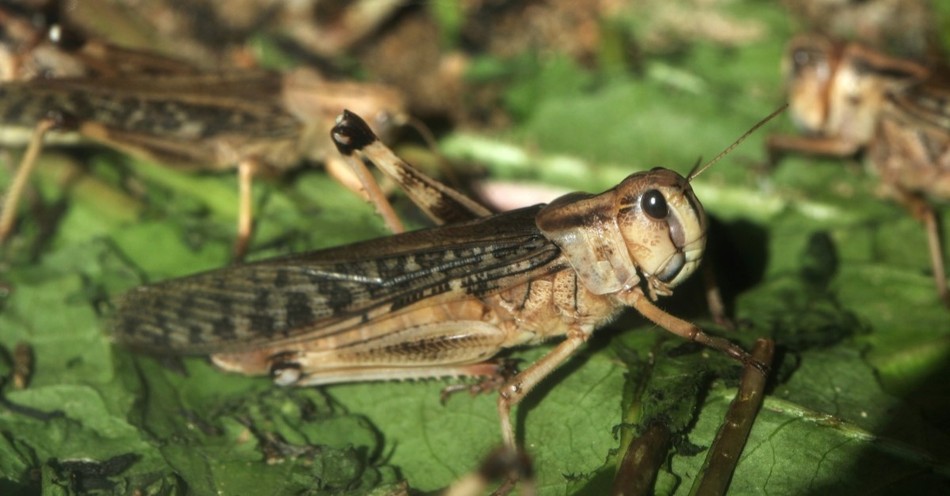Are locusts in the Bible metaphors for many kinds of trouble or an apocalyptic monster? Whichever view you take, seeing locusts in Bible times and now is not a good omen. They wipe out entire crops, causing famine in agricultural societies.
The desert locust—likely the species that destroyed crops in Bible times—is three to five inches long and consumes its body weight in food each day. They breed rapidly and travel in large clouds in their swarming phase, consuming all vegetation in their path. A massive swarm of desert locusts can spread more than 400 square miles. If 100 million locusts fly per square mile, that equals 40 billion locusts consuming about 176 pounds of vegetation daily. In addition, locusts’ excrement poisons uneaten vegetation in their wake.
What Are Locusts Known for Today?
To many people in America, locusts are known for annoying tourists and outdoor enthusiasts. I remember locusts swarming above the bleachers at a major league baseball game I attended. Some spectators tried to catch the large, buzzing insects in their hands.
However, locusts are still a danger. Locusts have swarmed in dozens of countries in the past five years, notably in East Africa and New England in the United States. When they impact several neighboring countries, we refer to this as a plague of locusts. Indeed, a locust infestation was the eighth plague God sent the Egyptians through Moses. The most devastating locust swarm in the United States occurred in 1874 when the Rocky Mountain locusts caused millions of dollars of damage in over two million square miles.
Locusts are a tasty delicacy in many African, Middle Eastern, and Asian countries. Fried, smoked, roasted, or dried, they are a source of protein and other nutrients. Jewish law permitted Hebrews to dine on locusts and other large insects (Leviticus 11:22). John the Baptist ate locusts as part of his diet in the wilderness of Judea (Matthew 3:1-4; Mark 1:6). Perhaps locusts as a food source rather than a destructive force was a sign of the new covenant proclaimed by John. Christ would turn around our sinful natures and create good through His love and sacrifice.
Were Locusts Feared in Biblical Times?
The writers of the Bible books of Exodus, Psalms, Jeremiah, Joel, and Revelation present images of locusts to sinful people as a reminder of God’s power and wrath.
A swarming locust invasion in Exodus is the eighth plague—given by God to convince the Egyptian pharaoh to “Let my people go” to the Promised Land with Moses. Ten plagues terrorize the Egyptians, and their severity increases with each successive plague. Moses warns Pharaoh that the locusts will “will cover the face of the ground so that it cannot be seen… They will fill your houses and those of all your officials and all the Egyptians—something neither you nor your forefathers have ever seen from the day they settled in this land till now” (Exodus 10:4-6).
Moses’ warning of destruction comes true, and the results are so dramatic that the locusts “covered the face of the whole land, so that the land was darkened, and they ate all the plants in the land and all the fruit of the trees that the hail had left” (Exodus 10:15).
The locusts’ attack weakens the resolve of the pharaoh. After plagues nine and ten, Pharaoh frees the Israelites from bondage in Egypt.
Do Locusts Have a Special Meaning in the Bible?
Due to their incredible ability to destroy crops and property, Bible prophets used real or imaginary swarms of locusts to warn people of God’s wrath. In addition to the plague of Exodus, Old Testament prophets Jeremiah and Joel warn the Israelites that locusts, representing military or personal trouble, will ruin them if they do not stop worshiping false gods. The Hebrew people must return to their God to avoid a locust invasion in their historic, Biblical context. God will punish His people for straying, the prophets cry.
Jeremiah, the “weeping prophet,” uses the image of a locust attack to warn the idol-worshipping Israelites to change their ways: “The Lord Almighty has sworn by himself: I will surely fill you with troops, as with a swarm of locusts, and they will shout in triumph over you (Jeremiah 51:14). Jeremiah’s vision of soldiers who number as great as a swarm of locusts—leaving the Israelites defenseless—comes true when Babylonian troops attack unfaithful Jerusalem. Yet there is redemption in Jeremiah 46:28 when God promises he will be with the people.
The second chapter of Joel poetically describes an attack on Israel by a great army of soldiers (Joel 2:1-11) who will ravage Israel’s land like a locust swarm (Joel 1:1-4, 6-7, 15). Whatever blight or doom is prophesied for the nation of Israel, in Joel’s prophecy, there is also a promise that God will forgive them at this late moment in their history (Joel 2:12-13).
God is warning His people and reaching out to them with mercy through His prophets.
In another Old Testament prophet’s book, Nahum told of God’s scorn for ancient Nineveh’s corrupt and materialistic culture (Nahum 1:1-3, 14 and 2:7-10), with evil entrepreneurs who swarm like locusts, consuming people’s fortunes: “You have increased the number of your merchants till they are more numerous than the stars in the sky, but like locusts they strip the land and then fly away” (Nahum 3:16). Locusts imagery again evokes a frightening, vivid picture of hostile forces overtaking an evil settlement. Nahum further predicts Ninevite’s demise by comparing the city’s sleeping guards to dormant locusts (Nahum 3:17). The locust imagery of Nahum is part of God’s wake-up call to the Ninevites, similar to the alarm sounded in Jeremiah’s and Joel’s locust passages.
What Other Old Testament Passages Mention Locusts?
In a lengthy Old Testament list of curses that will fall upon the Israelites for disobeying God, the Bible says, “You will sow much seed in the field, but you will harvest little, because locusts will devour it” (Deuteronomy 28:38). All of the Israelites “crops” will come to nothing if God chooses to release locusts on His disobedient people. The “seed” may be interpreted as God’s choosing Abraham and Sarah to found His nation and Moses’ leading them to the Promised Land. Yet the Israelites continually stray from following their God in Old Testament history.
In another reference to locusts, Psalms 105:34-35 reminds us of the heartache of the eighth Egyptian plague: “[God] spoke and the locusts came, grasshoppers without number; they ate up every green thing in their land, ate up the produce of their soil” This Psalm outlines the Hebrew people’s storied history, including the plagues in Egypt. Still, the Psalm begins and ends with joyful reminders of God’s faithfulness to his people (Psalm 105:5-8).
And in Amos 4:9, the Lord declares, “‘I struck you with blight and mildew; your many gardens and your vineyards, your fig trees and your olive trees the locust devoured; yet you did not return to me.’” This prophecy sums up the many warnings God gave His people, like a parent threatening the same punishment repeatedly to a child. God is hesitant to punish and is full of mercy. Israel does not heed the Lord, however; its social, political, and spiritual practices lead to its ruin in Bible times.
Where Do We See Locusts in Revelation?
The most frightening image of locusts in the Bible is in the apocalyptic book of Revelation. Passages in Revelation describe large numbers of cruel soldiers that fly and swarm like locusts with a wild combination of physical traits: men’s faces, women’s hair, lion’s teeth, and horse’s bodies. The locusts of Exodus—capable of destring crops and furniture—are mild creatures compared to the hideous locusts of John’s Revelation. Revelations’ locusts torture people without the “seal of God” upon their forehead. The locusts are released by an angel known as Apollyon or "Destroyer" to deliver God’s vengeance:
“ . . . And there came out of the smoke locusts upon the earth: and unto them was given power, as the scorpions of the earth have power. And it was commanded them that they should not hurt the grass of the earth, neither any green thing, neither any tree; but only those men which have not the seal of God in their foreheads. And to them it was given that they should not kill them, but that they should be tormented five months: and their torment was as the torment of a scorpion, when he striketh a man. And in those days shall men seek death and shall not find it; and shall desire to die, and death shall flee from them.” (Revelation 9:3-6)
These hideous locust spawns are armed for battle:
“And they had breastplates, as it were breastplates of iron; and the sound of their wings was as the sound of chariots of many horses running to battle. And they had tails like unto scorpions, and there were stings in their tails: and their power was to hurt men five months.” (Revelation 9:2-10 KJV)
Locusts are indeed monsters in the book of Revelation, whose function is to punish God’s people for not obeying His commandments.
God remains merciful, however. When King Solomon builds the temple in Jerusalem, God is pleased with “this place for myself” and blesses the Israelites:
“When I shut up the heavens so that there is no rain, or command the locust to devour the land, or send pestilence among my people, if my people who are called by my name humble themselves, and pray and seek my face and turn from their wicked ways, then I will hear from heaven and will forgive their sin and heal their land.” (2 Chronicles 7:13-14)
If locust outbreaks represent bad times for a community, God’s promise to Solomon gives us hope.
Another encouraging prophecy of Joel gives us hope: And I will restore to you the years that the locust hath eaten, the cankerworm, and the caterpillar, and the palmerworm, my great army which I sent among you” (Joel 2:25). This prophecy says that bad times will end. People will recover from grief over health, relationship, employment, and financial losses. Our spirits will be restored.
Yes, Locust swarms in Bible history and today are a powerful reminder of creation’s intentional or unintentional chaos. Yet the God of the Hebrews, the God of today, promises to “give back” joy in good times ahead of us when the locusts don’t swarm.
Photo Credit:©GettyImages/wrangel

This article is part of our Bible resource for understanding the significance and meaning of biblical phrases and ideas. Here are our most popular Bible articles to grow in your knowledge of God's Word:
Promises of God in the Bible
Is "This Too Shall Pass" in the Bible?
What Was the Ark of the Covenant?
Top 10 Bible Stories for Kids
“Iron Sharpens Iron” in Proverbs 27:17
"Fearfully and Wonderfully Made" in Psalm 139
“Be Still and Know That I am God” in Psalm 46:10
"No Weapon Formed Against Me Shall Prosper" - Isaiah 54:17









